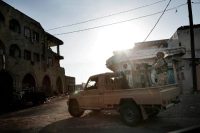
Renewed Hope for Peace in Yemen
The people of Yemen have had enough. More than three years of war have killed thousands, displaced more than 500,000, created the worst cholera epidemic and brought about 14 million Yemenis to the brink of starvation.
Desperate to escape famine, to be reunited with their loved ones, to mourn the dead, to save the future of their children, Yemenis are picking through the scattered signs of hope that this conflict might end.
On Thursday, for the first time in two years, the government of Yemen will sit down with Ansar Allah, who are commonly referred to as the Houthis, in Sweden.… Seguir leyendo »








